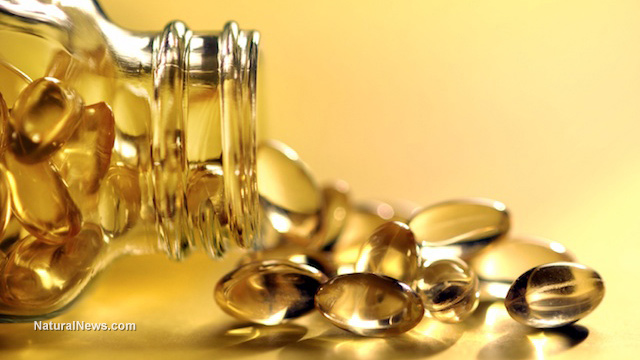Omega 3 fatty acid known as DHA shown to counter the adverse health effects of high fructose corn syrup, reveals new animal study
Friday, May 13, 2016 by: S. Johnson
Tags: HFCS, Omega 3, protective foods

(NaturalNews) Corn, and more specifically, high-fructose corn syrup, is injected into nearly every corner of the food supply, from baked goods to sweetened beverages. Although the substance has been linked to a host of maladies, a new study has established that an important omega-3 fatty acid known as DHA can reverse the genetic damage caused by fructose.
In the recent study, published in EbioMedicine, UCLA researchers found that fructose can damage hundreds of genes and gene networks in the brain, which are responsible for metabolism and brain function. These genetic changes are associated with various illnesses, including diabetes, heart disease and Alzheimer's disease.
Fructose has been shown to damage genes by removing or adding a biochemical group to cytosine, one of the four nucleotides that comprise DNA, which heavily impacts the way genes are turned on and off. Consistently consuming high-fructose corn syrup can increase brain toxicity, impairing both memory and the ability to learn.
Omega-3s quash genetic damage caused by fructose
But there is good news. The adverse effects of high-fructose corn syrup can be counteracted by an omega 3 fatty acid called docosahexaenoic acid, or DHA for short. It is a key component in the development of the brain and eyes. Omega-3 fatty acids are essential amino acids, meaning they are not produced by the body, but must be obtained through diet. Although DHA occurs naturally in the membranes of neurons, it is not present in high enough concentrations to ward off disease."DHA changes not just one or two genes; it seems to push the entire gene pattern back to normal, which is remarkable," explained Xia Yang, a senior author of the study and a UCLA assistant professor, in a press release. "And we can see why it has such a powerful effect."
DHA increases the strength of synapses in the brain, which helps boost memory and learning abilities. It is plentiful in wild salmon but not in farmed salmon. Other sources of DHA include fish and fish oil, walnuts, flaxseed, as well as fruits and vegetables, noted co-author of the study, Fernandez Gomez-Pinilla. "The brain and the body are deficient in the machinery to make DHA; it has to come through our diet," he said.
Giving rats corn scraps
The researchers tested the effects fructose had on the body by dividing rats into three separate groups. For six weeks, one group of rats received plain water devoid of DHA, another received fructose water and a diet abundant in DHA, and a third group received water with fructose equivalent to the amount found in a liter of soda pop.After six weeks, the rats retook a maze test. Rats who drank fructose water made it through the maze in about twice the time as the rats who drank plain water. This suggests a fructose diet diminished the rats' memory. Interestingly, the rats fed fructose and DHA showed similar results to the rats that only drank water, suggesting that DHA countered the effects of fructose.
In addition, the rats receiving a high-fructose diet experienced a number of health problems, including higher blood glucose, triglycerides and insulin levels, which have been linked to obesity, diabetes and various other diseases.
Sequencing the genome
The team sequenced more than 20,000 genes in the rats' brains. They discovered more than 700 genes in the hypothalamus, a region of the brain responsible for metabolic control, and more than 200 genes in the hippocampus, a region of the brain responsible for memory and learning, were damaged by fructose.Among the 900 genes identified, the researchers found that two genes, known as Bgn and Fmod, were the first genes to be impacted by fructose. Once these genes are impaired, they set off a domino effect that alters hundreds of other genes. The researchers noted that these two genes could serve as a target for new drugs to treat illnesses triggered by gene alterations in the brain.
To reduce your consumption of fructose, the authors of the study recommend avoiding soft drinks loaded with sugar, cutting back on desserts, as well as consuming less sugar and saturated fat in general. In addition, when fishing for salmon at the supermarket, be sure the fish is wild salmon instead of farmed salmon to reap the most health benefits.
Sources include:
ScienceDaily.com
Diabetes.co.uk
Food.NDTV.com
LifesDHA.com
AJCN.Nutrition.org
Science.NaturalNews.com
HFCS at FETCH.news
Get independent news alerts on natural cures, food lab tests, cannabis medicine, science, robotics, drones, privacy and more.
Take Action: Support Natural News by linking to this article from your website
Permalink to this article:
Embed article link: (copy HTML code below):
Reprinting this article:
Non-commercial use OK, cite NaturalNews.com with clickable link.
Follow Natural News on Facebook, Twitter, Google Plus, and Pinterest
- Newly released JFK files reveal Pentagon's role in creating Lyme disease and covid in the same lab
- DEADLY DECEPTION: How COVID vaccines increased mortality rates and why authorities hid the truth
- CDC finally halts $11 billion COVID funding scam as health officials admit the ‘pandemic’ was a fraud
- The hidden dangers in your kitchen: How cooking methods impact diabetes, cancer and aging
- GAIN-OF-FUNCTION CAT-BIRD-FLU now on the rise as nearly a dozen cats in Colorado "test positive" for Bird Flu due to contaminated cat food
- Here are TEN all-natural ways to protect your garden without using harmful chemicals
- Trump's greatest betrayal so far: Accelerating Middle East wars, silencing dissent, and serving Zionist masters
- Why you should think twice before buying mainstream toothpaste formulas
- Ginseng's hidden anti-aging power: How compound K is rewriting the rules of skincare
- ATTENTION PRESIDENT TRUMP: Please WITHDRAW your nomination of Dr. Susan Monarez for CDC Director as she is a VAX FANATIC and TOXIC JAB ZEALOT
- Was JFK's assassination orchestrated by a CIA double agent? New evidence points to James Angleton as the “architect”
- “Endgame: The Hidden Agenda 21” unveils a world of conspiracy and control
- Home gardening for preppers: A beginner's guide to growing your own food
- Senate Democrats deny censorship industrial complex existed, defend government's role in silencing dissent
- Record honeybee deaths devastate U.S. agriculture, pesticides under scrutiny
- Paper or plastic? The environmental deception behind bag bans
- Lab leak confirmed? Boris Johnson's stunning reversal on COVID origins sparks global debate
- Speaker Johnson warns Congress may defund or disband rogue courts targeting Trump
- Newly released JFK files reveal Pentagon's role in creating Lyme disease and covid in the same lab
- Elon Musk: Aliens could be here on Earth RIGHT NOW
- Festive flavors: The sweet history, nutritional profile and health benefits of pecan pie
- Trump reverses course on Gaza plan, says “nobody is expelling Palestinians”
- Reclaim your health: How midlife exercise reverses years of inactivity
- Big Pharma's $8 Billion bribery scheme exposed: how doctors are pushed to prescribe junk science, not heal
- Boys are back in town: Trump’s patriotic alpha crew takes the wheel while toxic females ride in the backseat
- EPA advisor admits the agency is funneling billions to climate groups ahead of Trump’s return to White House
- Space war brewing? Russia threatens to destroy Starlink satellites
- Survival 101: Effective EMF blocking techniques
- A lack of integrity in Academia: Harvard professor found GUILTY of fraudulent research to promote CRT theory
- Mike Adams Sermon 66: God will DESTROY ISRAEL for its wickedness
- 5 Simple steps to boost your brainpower: How to strengthen executive function in a distracted world
- Rep. Nancy Mace introduces bill to ban biological males from female facilities on federal property
- Sugarcane extract superior to cholesterol-lowering drugs?
- WHO focusing more on policing speech about public health and implementing global surveillance systems
- Pilots report mysterious lights 'moving at extreme speeds' across Oregon skies
- Dr. Mike Yeadon releases 15-minute testimony - WATCH - about genocidal intent of COVID “vaccines”
- EPA advisor admits the agency is funneling billions to climate groups ahead of Trump’s return to White House
- The Health Ranger releases “Vaccine Zombie” song and music video, using AI-animated zombies for the music video
- California's social media censorship law struck down: A victory for free speech or a threat to online safety?
- Dr. Mike Yeadon releases 15-minute testimony - WATCH - about genocidal intent of COVID “vaccines”
- The pandemic as a tool for INDOCTRINATION: Understanding “The Indoctrinated Brain” by Dr. Michael Nehls
- Florida takes a stand: DeSantis proposes permanent ban on mRNA vaccine mandates
- Mike Adams releases country western hit single: Goin’ Back in Time is Comin’ Home
- Mike Adams releases music poetry sensation: A Child of God
- “Why we influenced the 2020 elections”: Facebook files reveal the coordinated effort to bury the Hunter Biden laptop story
- RFK Jr. clears key hurdle: Sen. Susan Collins backs controversial HHS nominee, signaling a new era for health policy
- Unpacking the Lies That We’ve Been Fed – new song and music video released by Mike Adams, the Health Ranger
- Mike Adams releases new song and music video: Nothing More Disgusting Than a Globalist
- Newly released JFK files reveal Pentagon's role in creating Lyme disease and covid in the same lab
- Congratulations to the FULLY UNVACCINATED as you resisted the COVID-19 PROPAGANDA MACHINE fueled by over $100 BILLION
- Michigan sheriff announces criminal investigation into 2020 election crimes, Dominion Voting Systems
- Israeli soldiers accused of even more torture and abuse in the West Bank
- Migrants are taking advantage of recent hurricanes to scam residents and loot their homes
- House Intelligence Committee calls for the ARREST and PROSECUTION of Dr. Anthony Fauci
- Red Cross issues warning to stop blood plasma donations from vaccinated people
- Scientists confirm: GENIUS brain function can be spontaneously unleashed in humans without any apparent cause
- EPA advisor admits the agency is funneling billions to climate groups ahead of Trump’s return to White House
- HYSSOP: What research reveals about the health benefits of this ancient holy herb
- Two containers with completed ballots fall out of truck in Florida
- Fully vaccinated about to see “tsunami” of illness and death, warns virologist
- Global leaders unite to clamp down on “misinformation” with UN-backed Cascais Declaration
- BREAKING: 2025 NDAA authorizes mandatory military draft of WOMEN across America… as Pentagon pursues global NUCLEAR war with both Russia and China at the same time
- Michael Yon warns of a ZIONIST TAKEOVER in Trump’s second administration
- BOMBSHELL: DNA testing kits are a SCAM to develop ethnic-specific bioweapons
- Ozempic and Wegovy weight loss drugs are injectable LIZARD VENOM PEPTIDES that may unleash a devastating wave of organ failure… side effects align with symptoms of SNAKE BITES
- Israeli soldiers accused of even more torture and abuse in the West Bank
- These 13 countries just signed an agreement to engineer a global FAMINE by destroying food supply
- NASA admits that climate change occurs because of changes in Earth’s solar orbit, and NOT because of SUVs and fossil fuels
- RFK Jr. clears key hurdle: Sen. Susan Collins backs controversial HHS nominee, signaling a new era for health policy
- Sermon 30: How Jesus reveals Caesar’s FAKE CURRENCY and FALSE AUTHORITY
- Coriander seeds: Ancient medicine backed by modern science
- Arizona officials claim Maricopa County needs 10-13 days to tabulate results of the election
Science News & Studies
Medicine News and Information
Food News & Studies
Health News & Studies
Herbs News & Information
Pollution News & Studies
Cancer News & Studies
Climate News & Studies
Survival News & Information
Gear News & Information
News covering technology, stocks, hackers, and more



"Big Tech and mainstream media are constantly trying to silence the independent voices that dare to bring you the truth about toxic food ingredients, dangerous medications and the failed, fraudulent science of the profit-driven medical establishment.
Email is one of the best ways to make sure you stay informed, without the censorship of the tech giants (Google, Apple, Facebook, Twitter, YouTube, etc.). Stay informed and you'll even likely learn information that may help save your own life."
–The Health Ranger, Mike Adams












































